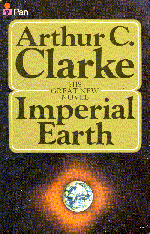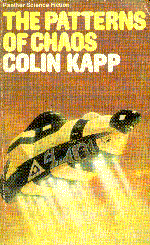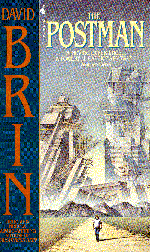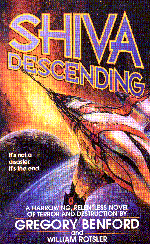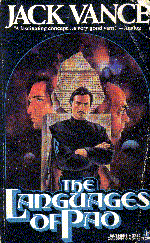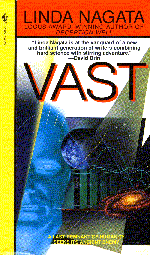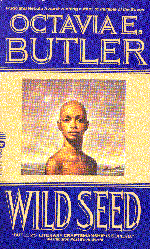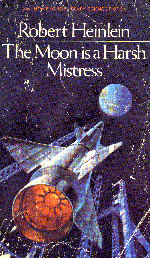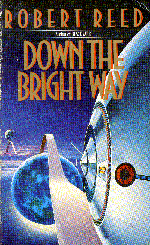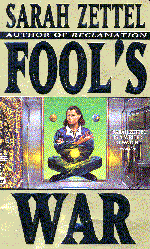|
Tentacles The SF Reviews newsletter, 30th November 2002
FlightI've read some really bad books this month. Luckily for you I haven't been able to bring myself to review most of them and I'll avoid dwelling on them on here. But, just so you know, I've suffered for my craft. It's not all fun in this eyrie, gazing out over this strange city, gentle music softening the sunrise blazing through the glass. Sometimes the harsh edge of reality intrudes and disturbs my contemplations. Why even now I can hear Christmas carols drifting up from the street speakers. Tinny and echoed, appalling renditions of once-respected songs. For a start, where's the bass gone? And speaking of the bass: Happy birthday to Uttam, musician and now successful businessman. I may fly to other worlds in my dreams, but he's gone and got his private pilot's license and, damn his eyes, gone out and bought a plane! Thinking of other worlds, or more precisely, parallel worlds, I came across this transcription of an interesting discussion between Hal Clement (as moderator), Richard Pini, Don Sakers, Allan Wold, and Roger Zelazny.
Best Books This MonthThe best books this month were, best first:
Heinlein's masterpiece remains as good today as it was in the '60s. Sadly Mycroft Holmes, the AI star of the novel, remains as far off today as it was then. One thing the novel taught me was TANSTAAFL. This is one of only two long acronyms that I've managed to remember for more than five minutes: There Ain't No Such Thing As A Free Lunch. Hah! The other acronym that remains in my memory, APSTNDP, describes the OSI seven-layer network model: Application, Presentation, Session, Transport, Network, Data link and Physical. And a fat lot of good it was to me. I spent substantial time working out, from those initial letters, a dubious ditty dedicated to the amazing Fishnet, a young lady of my acquaintance at that time and certainly one of the most beautiful ladies anywhere, anytime. Well the acronym and the lady live on, but the OSI seven-layer model was been eclipsed by the pervasive tcp/ip. This, as we all know, is the foundation of the Internet through which you are reading this now. So how about that, then? Brin outdid himself with "The Postman", a moving novel of a revival of civilisation in a post-apocalypse America. Read the book and watch the rather different, but still satisfying movie. "Fool's War" is, in my opinion, the best so far of Sarah Zettel's novels. It's classic SF with interesting twists. It is very satisfying.
Worst Books This Month
It's a little shocking to see Jack Vance appearing in this section, but "The Languages Of Pao" was not exactly a masterpiece. "Vast" is consistent with Linda Nagata's other works. In other words, it's so full of promise that is casually thrown away. It's got such great ideas but the writing is just not good enough to do them justice.
This Month's Reviews{?nrereviews?} Two good books this month were Colin Kapp's "The Patterns Of Chaos" and Arthur C. Clarke's "Imperial Earth". As a teenager I loved an excellent series by Kapp in Galaxy magazine (well, it may have been New Worlds – it's far too long ago for me to remember clearly). The novel is pretty good, but doesn't leave me with as many haunting images as did that old series. I wasn't keen on his subsequent books, but "The Patterns Of Chaos" scores with its awe-inspiring premise: planet-busting missiles launched from another galaxy 700 million years ago and targeted at just one man. I believed it, in fact I still keep looking over my shoulder, up into the sky, nervously. Clarke works an interesting introduction to pentominoes into "Imperial Earth". If you want to find out more, check out Jay Jenicek's pentominoes page. [Sadly that page is now gone, but have a look at Polyomino]
Next Month's ReviewsAsimov's "Foundation" for one. And I'm trying really hard to get at least one review of Susan R Matthews and Katherine Kerr's novels completed. There's Greg Egan's "Schild's Ladder" freshly read and ripe for a review. Plus I'm working through an appallingly bad book, "Gilpin's Space" by Reginald Bretnor for which I may be able to write a couple of dismissive lines. Sadly, the Dhalgren review won't be appearing. I'm still getting nowhere with this fantastic book. Which brings us neatly on to the next topic.
Still Getting Nowhere With Delaney's "Dhalgren"Yes. well, I'm trying. Even the complete personality makeover of last month has failed to put me into the correct mental framework to read this properly. The tequila and tobacco have floated me, very nicely indeed thank you, through the past month but it does seem to have been rather harder to get any reading done amidst all my mellow inactivity. Maybe next month.
Nanotechnology NoteIf you've ever day-dreamed about Homing Peptides Mounted On Semiconductor Particles Deliver Tiny Payload To Cancerous Tissue in Live Mice, now is your chance to catch up on the reality of the first successful targeting of an inorganic nanomachine into a cancerous tumour:
Faster-than-light Travel NoteSten Odenwald has done some interesting writing about classic SF FTL travel technologies. He provides an entertaining discussion firstly of how SF has evolved in correspondence with scientific knowledge, and secondly of how modern SF has, in the author's view, lost all contact with its original scientific underpinnings. The author is wrong with this second conclusion, of course. Admittedly SF may drift away from current scientific investigation at times, but it of necessity has to retain the some connection. Thus there was the fresh, raw rise of cyberpunk - a more "realistic" SF – just as punk rock once supplanted glam rock and supergroups. Yet both now live on beside and as a part of their predecessors. SF themes are not only spin-offs from scientific research, they also inspire such research. One cannot look at a body of scientific knowledge and say what will always impossible. One can only say what is impossible if such and such elements of that knowledge are correct and complete. Effectively, one can only say what is improbable. Come on, just take a look again at the link I gave in a previous newsletter reporting that Aussie scientists have teleported light and believe that teleportation of matter is possible. That'd be a turn up for the books.
Turn UpsOn the subject of turn ups, let's conclude with two Tommy Cooper library jokes:
He said and put it in a library. I thought "That's a turn-up for the books."
Cos it's strange, isn't it. You stand in the middle of a library and go 'Aaaaaaagghhhh!' and everyone just stares at you. But you do the same thing on an aeroplane, and everyone joins in.That's all for now. As always, tell me what you think about the books, the reviews and the site. Do let me know if there are books you think I should review.
Take care
Max
|
|


